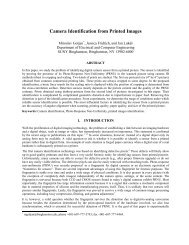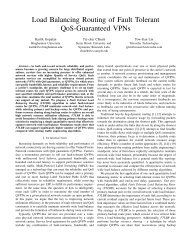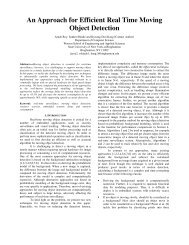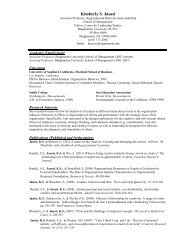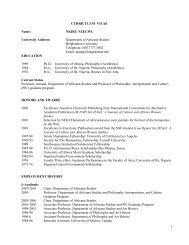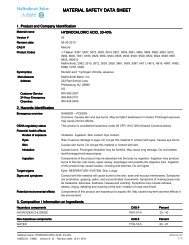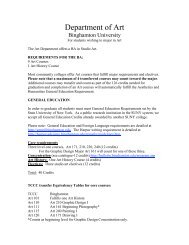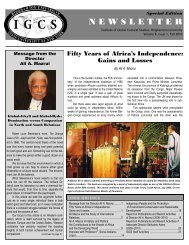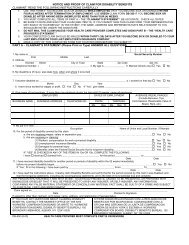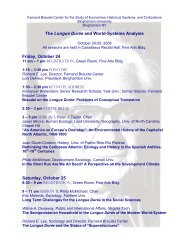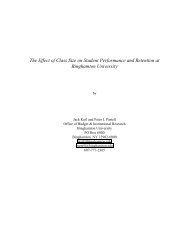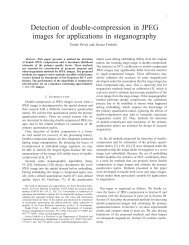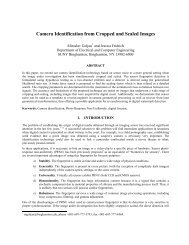History - Binghamton University
History - Binghamton University
History - Binghamton University
Create successful ePaper yourself
Turn your PDF publications into a flip-book with our unique Google optimized e-Paper software.
Wagar, W. Warren, Distinguished Teaching<br />
Professor and Director of Undergraduate<br />
Studies, PhD, 1959, Yale <strong>University</strong>: European<br />
intellectual history, alternative futures. (1971)<br />
Williman, Daniel, Professor (joint with Classics),<br />
PhD, 1973, <strong>University</strong> of Toronto: Medieval<br />
history. (1974)<br />
UNDERGRADUATE<br />
PROGRAMS<br />
The history curriculum promotes inquiry into<br />
the origins and development of human society.<br />
It also exposes students to the varieties of<br />
historical thinking. The program offers a balance<br />
between humanistic approaches to the study of<br />
the human experience and approaches based on<br />
the methods of the social and behavioral<br />
sciences.<br />
<strong>History</strong> Department courses are offered at<br />
three levels.<br />
1. Introductory courses: courses on the 100<br />
level; general introductions to and overviews of<br />
the history of a particular area or region (e.g.,<br />
general views of European, United States,<br />
Islamic, Far Eastern, African, and Latin<br />
American history). Open to all students (history<br />
majors and minors taking 100-level courses<br />
normally do so before their junior year). May be<br />
taken in any sequence.<br />
2. Intermediate courses: courses on the 200<br />
and the 300 levels. Courses on the 200 level are<br />
more specialized analyses of eras and themes.<br />
Courses on the 300 level are intensive examinations<br />
of a particular era or theme taught in a<br />
lecture-discussion format. For 300-level courses,<br />
the normal prerequisite is sophomore standing.<br />
3. Advanced courses: courses on the 400<br />
level. Courses on the 400 level (with the<br />
exception of HIST 498 and 499) are senior<br />
seminars in which a research paper is required.<br />
For 400-level courses, the normal prerequisite is<br />
junior standing.<br />
Students planning to major or minor in<br />
history should consult, as early as possible, with<br />
the departmental director of undergraduate<br />
studies. <strong>History</strong> majors and minors should visit<br />
this office whenever they need advice on their<br />
programs. The <strong>History</strong> Department does not<br />
require that majors or minors specialize or<br />
concentrate in any area, period or type of<br />
history. Some students, however, may wish to<br />
create an ad hoc concentration by taking several<br />
courses in one field, such as the United States,<br />
Europe, the Third World, ancient history,<br />
modern history, social and economic history<br />
and the like. Those who do may seek advice<br />
from the director of undergraduate studies. The<br />
department accepts up to two history courses<br />
taken at other colleges in fulfillment of the<br />
requirements for the minor and up to four<br />
292<br />
history courses taken at another college in<br />
fulfillment of the requirements for the major.<br />
The department does not accept advanced<br />
placement credit, CLEP credit or course credit<br />
by examination in fulfillment of the requirements<br />
for the major or the minor.<br />
Requirements for<br />
<strong>History</strong> Major<br />
The Department of <strong>History</strong> requires for the<br />
major a minimum of 10 courses distributed as<br />
follows:<br />
1. Four courses: one from each of the<br />
following areas: (1) United States, (2) Europe, (3)<br />
a third area, e.g., Middle East, Asia, Africa, Latin<br />
America; and (4) world history or interregionally<br />
comparative history.<br />
2. At least three 300- or 400-level courses,<br />
one of which must be a senior seminar (HIST<br />
400 through 487A-Z) or HIST 492. The senior<br />
seminar may not be taken under the Pass/Fail<br />
option.<br />
3. At least three other history courses. HIST<br />
101, 102, 103 and 104 do not count toward the<br />
major when taken by students in their junior<br />
and senior years. Furthermore, no more than<br />
two courses may be counted from among the<br />
above listed courses to satisfy this requirement.<br />
4. No more than one course of HIST 397,<br />
Independent Study, may be used to satisfy the<br />
total requirements for the major. Only one<br />
course taken under the Pass/Fail option will be<br />
credited to the major. HIST 395 does not count<br />
toward the major.<br />
5. The <strong>History</strong> Department views the grade<br />
of D as passing but unsatisfactory. Courses<br />
passed with a grade of D do not fulfill requirements<br />
for the major.<br />
Honors Program<br />
The director of undergraduate studies administers<br />
the honors program offered by the Department of<br />
<strong>History</strong>. Candidates for honors must consult with<br />
the director and complete a form kept in the<br />
Harpur College undergraduate advising office.<br />
To be eligible to earn honors, a history<br />
major:<br />
1. must have a GPA of 3.60 in history, not<br />
counting courses taken Pass/Fail;<br />
2. must have taken at least one senior<br />
seminar in which the student earned a<br />
grade of A or A–.<br />
Both of these conditions must be satisfied by<br />
the end of the student’s penultimate semester.<br />
In addition, the student must either write an<br />
honors thesis or take a written comprehensive<br />
examination. Whichever of these options is<br />
chosen, the work must be judged worthy of<br />
honors (Honors, High Honors or Highest<br />
Honors) by the faculty supervisor and one other




